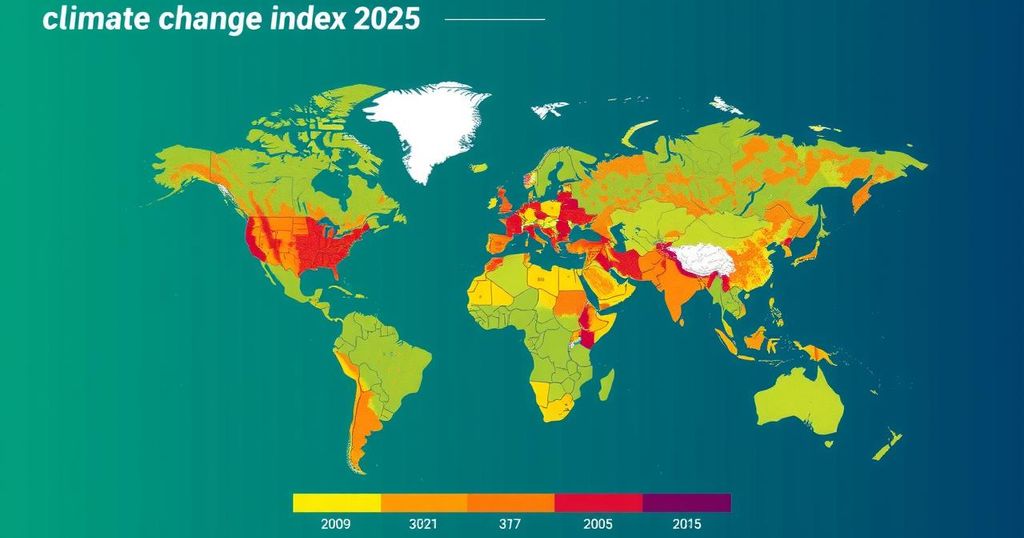The Climate Change Performance Index (CCPI) 2025 reveals significant growth in renewable energy across 64 assessed countries, yet highlights a troubling continued reliance on fossil fuels, particularly in many high-emitting nations. Denmark leads the rankings, followed by the Netherlands and the UK, while major emitters like the US and China display mixed progress. The EU benefits from positive reforms, showing no very low performers this year. The report calls for accelerated climate action to comply with the Paris Agreement.
The Climate Change Performance Index (CCPI) 2025, co-authored by Germanwatch, NewClimate Institute, and CAN International, evaluates the climate action efforts of the world’s largest emitters, covering 63 countries plus the European Union that together account for 90% of global emissions. Despite significant growth in renewable energy across many high-emission nations, a continuing reliance on fossil fuels persists, particularly fossil gas. The report notes that while the share of renewables rose in 61 of the 64 assessed countries over the past five years, emission trends in 29 countries remain low or very low, indicating inadequate progress. Denmark ranks highest among the assessed nations, landing at 4th place, excelling in climate policy performance yet still failing to achieve an overall high rating. Following Denmark are the Netherlands (5th), whose future climate commitment is uncertain due to political changes, and the United Kingdom (6th), which improved significantly owing to its coal phase-out policy and prohibition on new fossil fuel licenses. Conversely, Argentina fell to 59th place, demonstrating the risks associated with political shifts that can reverse climate progress. At the bottom of the rankings are Iran (67th), Saudi Arabia (66th), the United Arab Emirates (65th), and Russia (64th), all of which have minimal shares of renewables and continue to heavily invest in fossil fuels. China, the world’s primary emitter, is ranked 55th, exhibiting both a concerning dependence on coal and a burgeoning renewable sector that signals potential future improvements. The United States remains at a very low 57th rank, needing to enhance investments in renewables while eliminating fossil fuel subsidies to boost climate performance. Among the G20 nations, only the UK and India (10th) demonstrate high performance, while many others display low emissions reduction efforts, particularly Russia and Saudi Arabia. The European Union, positioned at 17th overall, benefits from the success of its Green Deal, with numerous member states emerging as high and medium performers. Notably, the changing landscape reveals no European Union country receiving a very low performance rating this year, a positive shift compared to prior assessments. This mixed evaluative scenario underscores the urgent need for all nations to intensify their climate actions to meet the targets set forth by the Paris Agreement.
The Climate Change Performance Index (CCPI) serves as an important tool for assessing country-level progress regarding climate change mitigation through a comprehensive evaluation of emissions, renewable energy adoption, and climate policies. The rankings are essential for understanding the effectiveness of climate actions globally, particularly among the largest greenhouse gas emitters, comprising 90% of worldwide emissions. The 2025 report highlights the advancements in renewable energy while indicating the continued reliance on fossil fuels, particularly fossil gas, which hampers effective climate mitigation. Such analyses not only inform policymakers but also signal to the international community the urgency for enhanced climate strategies, especially in light of global frameworks such as the Paris Agreement.
The CCPI 2025 report illustrates a varied landscape of climate action among the world’s largest emitters, with notable advancements in renewable energy juxtaposed against persistent fossil fuel reliance. While some nations like Denmark, the Netherlands, and the UK exhibit commendable policies and significant progress, others such as Iran, Saudi Arabia, and the United States reveal troubling dependencies on fossil fuels. As global emissions continue to rise, particularly among G20 countries, a collective push towards increased climate action is essential to meet the goals established by international agreements. The findings underscore the need for countries to prioritize transitions to sustainable energy sources, fostering a truly global response to the climate crisis.
Original Source: newclimate.org






